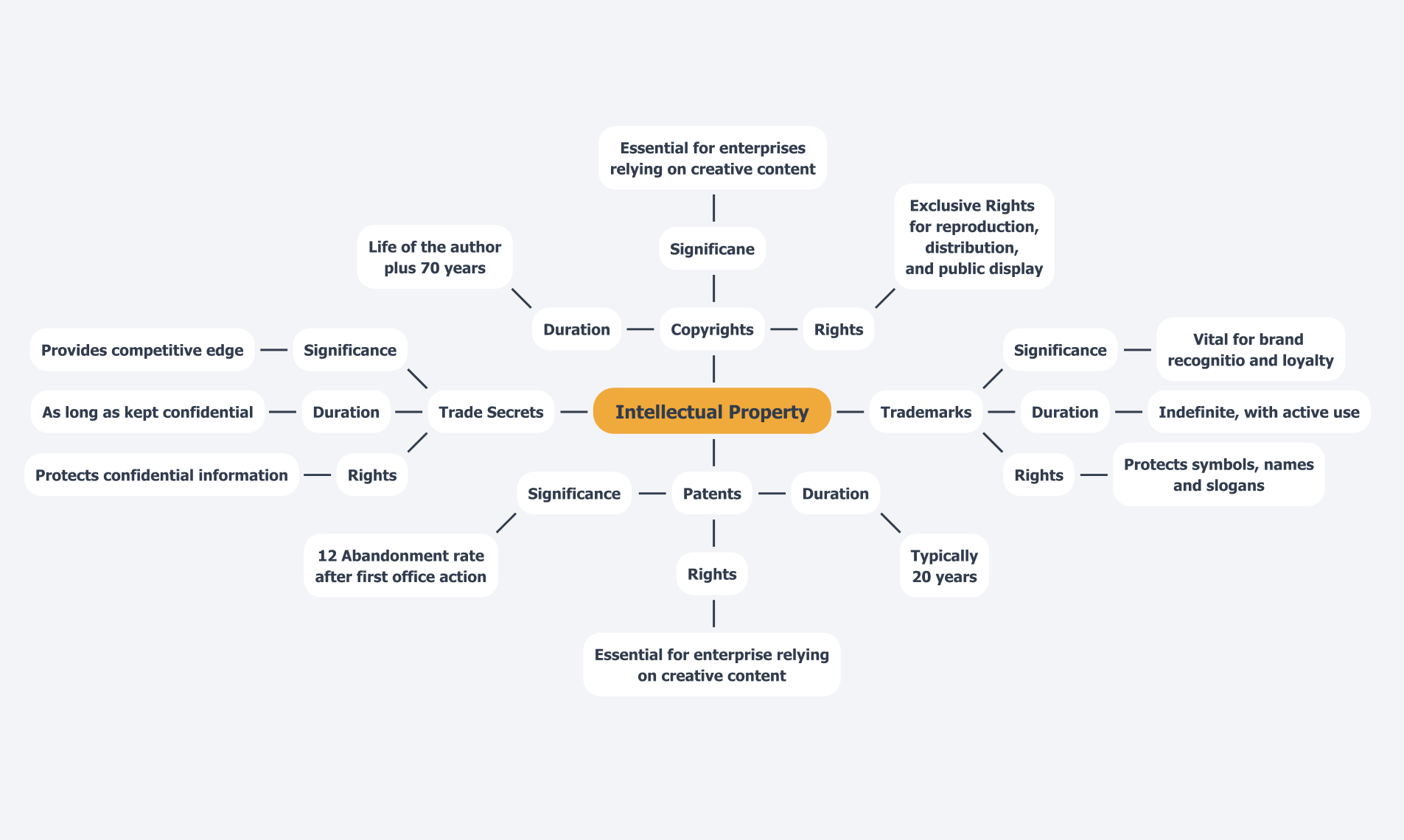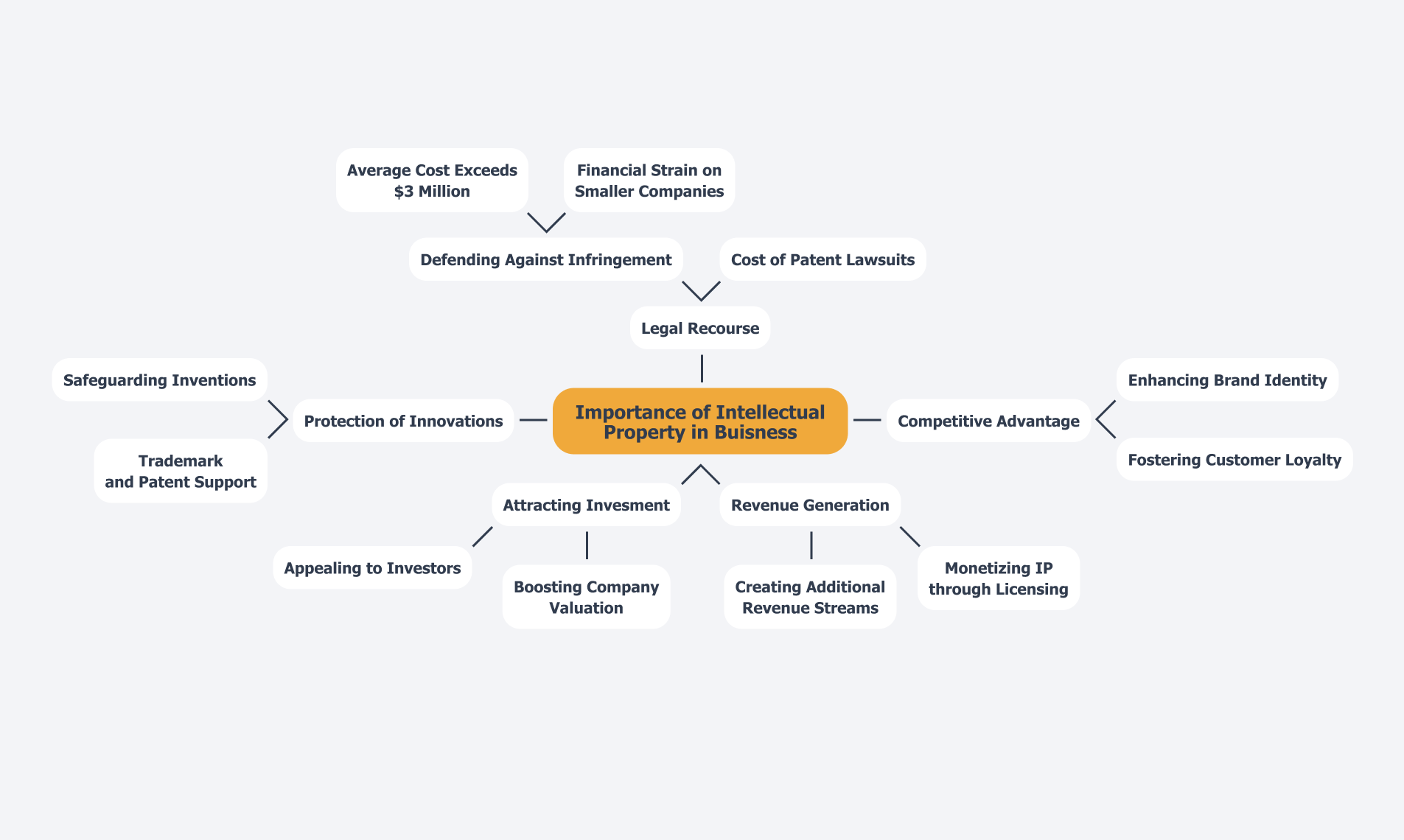Overview
The article examines the diverse types of intellectual property (IP) and underscores their significance for businesses. It is essential for companies to comprehend and adeptly manage these rights. Intellectual property—encompassing patents, trademarks, copyrights, and trade secrets—not only safeguards innovations and fosters a competitive edge but also plays a pivotal role in attracting investment and generating revenue. This is supported by real-world cases and statistics illustrating the economic impact of effective IP management.
Introduction
In a world where innovation drives success, understanding the intricacies of intellectual property (IP) has never been more crucial for businesses. IP encompasses a range of creations, from inventions to artistic works, serving as the backbone of competitive advantage in the marketplace.
As companies navigate the complexities of IP rights—including patents, trademarks, copyrights, and trade secrets—they encounter both opportunities and challenges that can significantly impact their growth and valuation. Recent trends highlight a growing awareness of IP’s economic importance; however, many organizations struggle with the knowledge gap surrounding effective IP management.
With high-stakes legal battles and the potential for substantial financial repercussions, the need for robust IP strategies is paramount. This article delves into the essential aspects of IP, exploring its significance, the various types, and the proactive approaches businesses can take to safeguard their innovations and thrive in an ever-evolving landscape.
Define Intellectual Property: An Essential Overview
Intellectual property (IP) encompasses the creations of the mind, including inventions, literary and artistic works, designs, symbols, names, and images utilized in commerce. It represents the legal rights that protect these creations, enabling creators to control their use and derive financial benefits. IP is classified into various kinds of intellectual property, such as patents, trademarks, copyrights, and trade secrets, each fulfilling distinct roles and providing particular protections. The significance of these kinds of intellectual property for enterprises cannot be overstated; they safeguard innovations and maintain a competitive advantage in the market.
As we look towards 2025, a notable trend emerges: the increasing recognition of IP’s role in driving economic growth. Experts assert that effective IP management can significantly enhance a company’s valuation and market position. Recent statistics reveal that approximately 70% of companies acknowledge the importance of understanding IP rights, yet only 40% feel adequately informed about them. This highlights a critical gap in knowledge that underscores the pressing need for IP education.
Real-world examples, such as the prolonged Apple vs. Samsung lawsuit, which spanned seven years and culminated in Apple being awarded $539 million, illustrate the high stakes involved in IP disputes. Furthermore, the average cost to defend against a patent infringement case often exceeds $3 million, with total costs ranging from $2 million to $9 million. These figures underscore the financial implications of IP protection.
The US Intellectual Property Enforcement has noted that IP infringement can adversely affect the economy and labor force, emphasizing the broader economic impact of IP issues. A case study from 2023 revealed that the research and technology sector led in trademark applications, highlighting the proactive approach organizations are taking towards IP. iPNOTE has emerged as a transformative force in global IP oversight, evidenced by its successful case studies across various markets. For instance, companies in the USA have reported a 7x return on investment in the number of deals through effective advertising strategies and clear positioning, supported by recommendations from personal managers. In South Korea, companies have experienced more than double their profits and attracted international clients by utilizing a platform for enhanced SEO and advertising campaigns. These success narratives highlight the significance of strategic IP management in improving organizational outcomes.
As the landscape of intellectual property continues to evolve, grasping its nuances is crucial for entities aiming to thrive in a competitive environment. iPNOTE’s commitment to providing a streamlined process for IP needs, as highlighted by testimonials from satisfied clients worldwide, positions it as a reliable partner for corporate IP managers seeking to navigate the complexities of intellectual property.
Explore the Four Main Types of Intellectual Property
The four primary kinds of intellectual property (IP) are essential for businesses to understand in order to protect their innovations and maintain a competitive edge:
- Patents: These legal protections are granted for inventions, allowing inventors exclusive rights to use, sell, or license their creations for a period of typically 20 years. In 2023, Japan alone awarded 201,420 intellectual property rights, highlighting the significance of such rights in promoting innovation. With this solution, corporate IP administrators can simplify the patent oversight process through task automation and notifications, greatly lowering IP oversight expenses and ensuring prompt replies to patent applications, which is essential considering the 12% abandonment rate following the initial office action.
- Copyrights: Copyrights safeguard original works of authorship, including literature, music, and software. They confer exclusive rights to creators for reproduction, distribution, and public display, lasting for the life of the author plus 70 years. This protection is essential for enterprises that depend on creative content. The automated task creation and reminders from the application guarantee that copyright oversight is effective and current, assisting companies in avoiding possible infringements.
- Trademarks: Trademarks protect distinctive symbols, names, and slogans that identify goods or services. They play a vital role in helping consumers differentiate between brands and can last indefinitely, provided they are actively used and maintained. This longevity is essential for brand recognition and loyalty. The platform provides efficient online oversight solutions for trademarks, simplifying the process for companies to uphold their brand identity and track possible infringements.
- Trade Secrets: Trade secrets comprise confidential information that offers a competitive edge, including proprietary formulas, practices, and processes. Unlike other forms of IP, trade secrets remain protected as long as they are kept confidential. iPNOTE’s extensive IP oversight tools assist in guaranteeing that trade secrets are efficiently tracked and secured, enabling companies to protect their distinctive processes.
Understanding the different kinds of intellectual property is essential for efficient IP oversight, particularly considering recent trends and advancements in the area. For example, the Recentive v. Fox case underscores the challenges encountered by machine-learning claims in fulfilling necessary standards, stressing the importance for organizations to remain aware of changing legal environments. Furthermore, recognizing how these kinds of intellectual property can interact or overlap in practice is vital for a holistic approach to IP management.

Understand the Importance of Intellectual Property in Business
Intellectual property (IP) is essential for businesses for several compelling reasons:
- Protection of Innovations: IP rights are fundamental in safeguarding a company’s inventions and creative works, preventing unauthorized use by competitors. This protection is crucial in maintaining a competitive edge in the market. The platform links individuals with specialized IP lawyers who can maneuver through the intricacies of IP legislation, guaranteeing that companies efficiently safeguard their innovations, including trademark and patent support.
- Competitive Advantage: Securing IP enables companies to distinguish themselves, enhancing brand identity and fostering customer loyalty. Companies that leverage their IP effectively can stand out in crowded markets, driving consumer preference. With the streamlined platform, organizations can easily discover the right legal expertise to improve their IP strategies.
- Attracting Investment: A robust IP portfolio significantly boosts a company’s valuation, making it more appealing to investors and partners. Studies show that companies with robust IP safeguards are more inclined to draw investment, as they exhibit a dedication to innovation and market leadership. The organization’s services assist companies in creating and sustaining a robust IP portfolio, thereby increasing their investment attractiveness.
- Revenue Generation: Businesses can monetize their IP through licensing agreements, creating additional revenue streams. This strategy not only enhances profitability but also allows companies to capitalize on their innovations without the need for direct market involvement. iPNOTE facilitates connections with IP professionals who can assist in structuring these agreements effectively.
- Legal Recourse: IP rights provide a legal framework for businesses to defend their creations against infringement. This legal protection is vital, especially considering that the average cost to defend a patent lawsuit exceeds $3 million, a burden that can be particularly challenging for smaller companies. The financial strain often leads firms to settle quickly, underscoring the importance of proactive IP management. iPNOTE’s platform offers access to experienced attorneys who can help mitigate these risks and provide guidance on legal recourse.
Furthermore, IP theft impacts not only companies but also the entire economy and employment landscape, highlighting the necessity for caution in safeguarding kinds of intellectual property. As FBI Director Christopher Wray pointed out, “Overcoming IP theft necessitates vigilance in all sectors,” highlighting the continuous need for organizations to prioritize their IP strategies. Companies can also consider engaging with services like iPNOTE, which offers a comprehensive approach to IP management, including access to a network of trusted providers and the Prime Ultra plan that enhances visibility and reduces costs.
In 2025, the role of intellectual property in driving innovation and business growth is more critical than ever. Companies that effectively leverage their IP not only protect their innovations but also position themselves for long-term success in an increasingly competitive landscape.

Conclusion
Understanding the intricacies of intellectual property (IP) is essential for businesses aiming to thrive in today’s innovation-driven marketplace.
This article highlights the significance of IP in safeguarding inventions, artistic works, and brand identities, thus providing a competitive edge.
With the increasing recognition of IP’s economic importance, organizations must bridge the knowledge gap to effectively manage their IP rights, including patents, trademarks, copyrights, and trade secrets.
The financial implications of inadequate IP management are stark. High-profile legal battles exemplify the substantial costs associated with defending IP rights. As businesses confront these challenges, proactive strategies become crucial. Tools like iPNOTE emerge as invaluable resources, streamlining IP management processes and connecting companies with legal expertise to safeguard their innovations effectively.
In conclusion, the landscape of intellectual property is constantly evolving, and businesses must remain vigilant and informed. By prioritizing IP management, companies not only protect their intellectual assets but also enhance their market position, attract investment, and create new revenue opportunities. Embracing a comprehensive approach to IP will ultimately empower businesses to navigate the complexities of this vital area, ensuring long-term growth and success in an increasingly competitive environment.
Protect Your Innovations with Smart IP Management! Start now with iPNOTE and secure your competitive advantage effortlessl.
Frequently Asked Questions
What is intellectual property (IP)?
Intellectual property (IP) encompasses the creations of the mind, including inventions, literary and artistic works, designs, symbols, names, and images used in commerce. It represents the legal rights that protect these creations, allowing creators to control their use and derive financial benefits.
What are the different types of intellectual property?
The main types of intellectual property include patents, trademarks, copyrights, and trade secrets. Each type fulfills distinct roles and provides specific protections.
Why is intellectual property important for businesses?
Intellectual property is crucial for businesses because it safeguards innovations and helps maintain a competitive advantage in the market.
How is the role of IP expected to change by 2025?
By 2025, there is an increasing recognition of IP’s role in driving economic growth. Effective IP management is expected to significantly enhance a company’s valuation and market position.
What do statistics reveal about companies’ understanding of IP rights?
Approximately 70% of companies recognize the importance of understanding IP rights, but only 40% feel adequately informed about them, indicating a significant gap in knowledge.
Can you provide an example of a notable IP dispute?
A notable example is the prolonged Apple vs. Samsung lawsuit, which lasted seven years and resulted in Apple being awarded $539 million.
What are the financial implications of defending against patent infringement cases?
The average cost to defend against a patent infringement case often exceeds $3 million, with total costs ranging from $2 million to $9 million.
What impact does IP infringement have on the economy?
IP infringement can adversely affect the economy and labor force, highlighting the broader economic implications of IP issues.
What trends are emerging in IP applications within specific sectors?
A 2023 case study revealed that the research and technology sector led in trademark applications, indicating a proactive approach toward IP by organizations.
How has iPNOTE contributed to global IP oversight?
iPNOTE has emerged as a transformative force in global IP oversight, with successful case studies highlighting significant returns on investment and improvements in organizational outcomes through effective IP management strategies.






